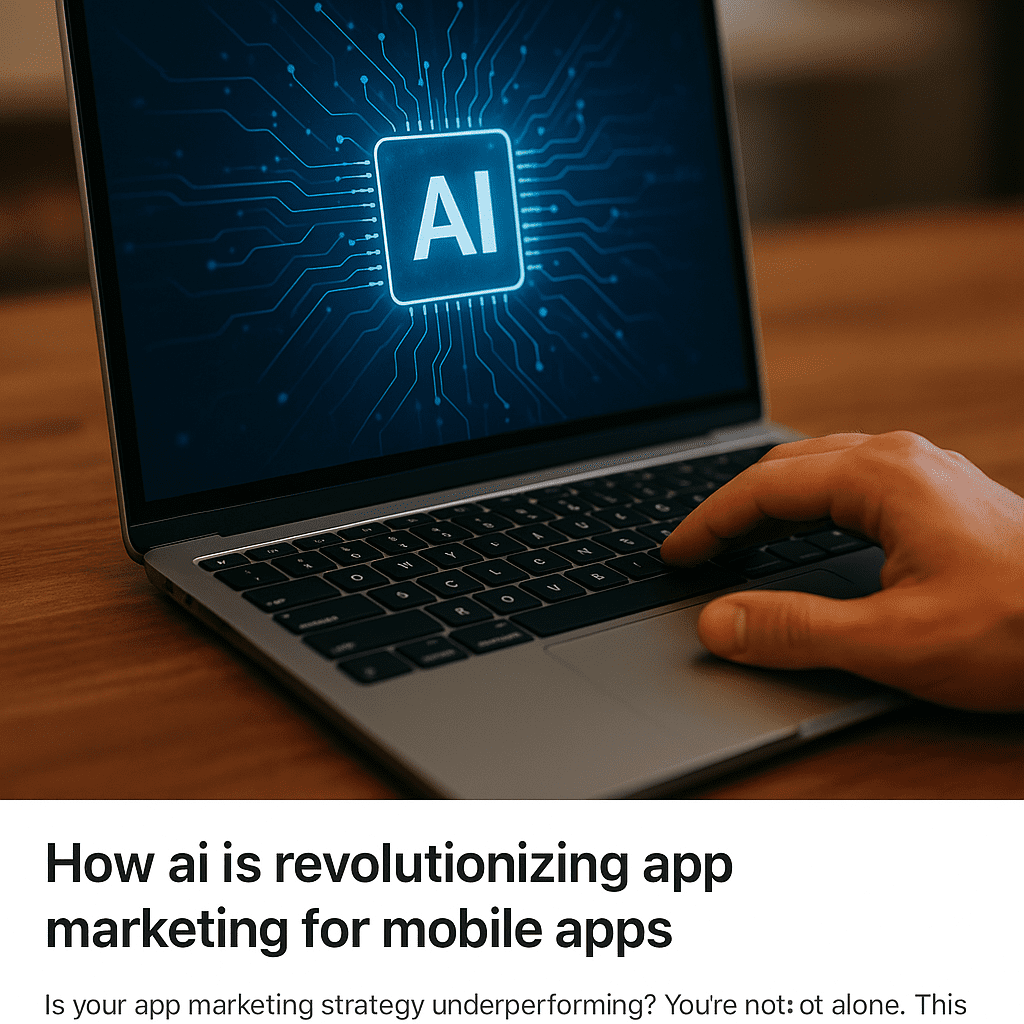
How AI is Revolutionizing App Marketing for Mobile Apps in 2025
In 2025’s hyper-competitive app ecosystem, standing out requires more than traditional tactics. Marketers are under pressure to acquire high-value users at scale while optimizing budgets and delivering personalized experiences. Artificial intelligence (AI) has emerged as the catalyst that transforms these challenges into growth opportunities—enabling real-time insights, predictive decision-making, and automated creative optimization.
In this expert guide, we’ll audit the latest data, correct common misconceptions, and lay out a clear roadmap for leveraging AI to drive sustainable app growth. You’ll learn:
- How AI adoption trends are reshaping performance benchmarks
- Practical AI solutions for common app marketing pitfalls
- High-impact AI applications—from LTV forecasting to dynamic creative optimization
- Actionable steps to integrate AI into your marketing stack
- Emerging trends on the horizon
The Current Landscape of AI in App Marketing
Adoption Trends and Performance Benchmarks
According to a mid-2024 Gartner survey, 86% of digital marketers plan to increase AI investments this year, underscoring its status as a strategic imperative. App marketers report average improvements of 30–50% in key metrics—such as cost per install (CPI) and return on ad spend (ROAS)—when deploying AI-driven solutions for segmentation, bidding, and creative personalization.
Market Dynamics and Competitive Pressure
The Apple App Store and Google Play host over 4.5 million apps combined. With user acquisition costs climbing above $5 for many categories, inefficiencies in targeting and messaging no longer just dent budgets—they threaten viability. AI equips growth teams with:
- Predictive analytics to forecast in-app behavior and lifetime value
- Automated bidding for programmatic campaigns
- Dynamic content generation to tailor ads and in-app experiences
Overcoming Common App Marketing Challenges with AI
Pitfall #1: One-Size-Fits-All Messaging
Challenge: Broad campaigns yield low engagement and high churn.
AI Solution—Hyper-Segmentation: Machine learning models analyze hundreds of behavioral and contextual variables—from device type to in-app actions—to create micro-segments. These segments power tailored push notifications, emails, and ad creatives that reflect each user’s stage in the journey. A study by Epsilon shows that 80% of consumers are more likely to convert when messaging is personalized to their preferences.
Pitfall #2: Inefficient Ad Spend
Challenge: Manual bid management and static audience definitions inflate CPIs.
AI Solution—Predictive Bidding and Budget Allocation: AI platforms ingest historical performance, seasonal factors, and competitive signals to predict the optimal bid for each impression. This approach drives up to a 50% reduction in acquisition costs, as reported by Business of Apps. Real-time budget reallocation ensures the highest ROI across channels and geographies.
Pitfall #3: Content Production Bottlenecks
Challenge: Creative fatigue and resource constraints delay campaign launches.
AI Solution—Dynamic Creative Optimization (DCO): Generative AI accelerates the production of headlines, descriptions, and visuals at scale. By testing thousands of creative combinations in real time, DCO platforms identify top-performing assets and automatically deploy them. Brands save 20+ hours per week on content tasks, freeing teams to focus on strategy and partner relationships.
Key AI Applications Transforming App Marketing
1. Audience Segmentation and Personalization at Scale
Modern AI algorithms cluster users based on multi-dimensional data—such as session frequency, feature usage, and in-app purchase behavior. This enables marketers to:
- Personalize onboarding flows and in-app prompts
- Recommend features or items with high predictive affinity
- Deliver hyper-targeted ad creatives across social and programmatic channels
2. Predictive User Behavior and Lifetime Value Forecasting
Traditional LTV models rely on simplistic averages. AI-driven LTV forecasting examines hundreds of metrics to predict each user’s future value with 85–90% accuracy. Variables include:
- Purchase frequency and average order value
- Churn probability based on engagement decay
- Referral potential and virality scores
With precise LTV estimates, performance teams can set efficient bid caps and allocate promotional budgets to the highest-value cohorts.
3. Advanced Attribution Modeling
AI-powered attribution platforms move beyond first- or last-touch models, reconstructing the full conversion path to assign credit across channels. This clarity drives:
- More accurate ROAS calculations
- Better channel mix optimization
- Data-driven budget rebalancing
Refined attribution insights empower app store optimization strategies by highlighting the distribution channels and creative formats that drive organic installs.
4. Real-Time Testing and Optimization
Continuous A/B and multivariate testing, once manual and slow, can now run in parallel across hundreds of variants. AI identifies statistically significant winners in hours, not weeks, accelerating time to insight and driving immediate performance gains.
Implementing AI in Your App Marketing Stack
1. Define Clear KPIs and Success Metrics
Identify the metrics that matter—be it CPI, ROAS, retention rate, or average revenue per user (ARPU). Align AI use cases, such as predictive bidding or personalization, with your most critical objectives.
2. Prioritize Data Hygiene and Privacy Compliance
High-quality AI depends on clean, consolidated data. Implement unified analytics platforms and enforce data governance policies. Ensure full compliance with GDPR, CCPA, and Apple’s App Tracking Transparency (ATT) framework to maintain user trust.
3. Evaluate and Integrate AI Tools
Select solutions tailored for mobile app growth. Look for vendors offering:
- End-to-end integration with your ad platforms
- Prebuilt connectors to your analytics and CRM
- Transparent reporting dashboards
For hands-on support, explore Admiral Media’s app marketing services and app store optimization expertise.
4. Pilot, Measure, and Scale
Begin with small-scale pilots to benchmark AI performance against control groups. Use those insights to refine models and roll out successful tactics across campaigns and regions.
Emerging Trends on the Horizon
- Augmented Reality Integration: AI-powered AR features in retail and gaming apps drive immersive experiences and boost session duration.
- Voice Search Optimization: As Siri, Google Assistant, and Alexa gain market share, optimizing app content and metadata for voice queries will become essential.
- Privacy-First Personalization: AI will enable granular personalization using on-device processing and differential privacy techniques.
- Hyperlocal Targeting: Geofenced campaigns powered by AI predict foot traffic and user context to deliver timely offers.
Conclusion: Charting a Successful AI-Driven App Marketing Roadmap
In 2025, AI has matured from an experimental tool into the cornerstone of effective app marketing. By addressing legacy challenges—such as generic messaging, wasteful ad spend, and creative bottlenecks—AI drives measurable gains in acquisition, engagement, and revenue.
Success depends on clear objectives, robust data practices, and a balanced partnership between automated intelligence and human creativity. Start small, measure rigorously, and scale what works. The future of app marketing is here. Are you ready to lead with AI?
For expert guidance and hands-on support, contact Admiral Media and discover how our team of growth specialists can tailor AI solutions to meet your app’s unique goals.
